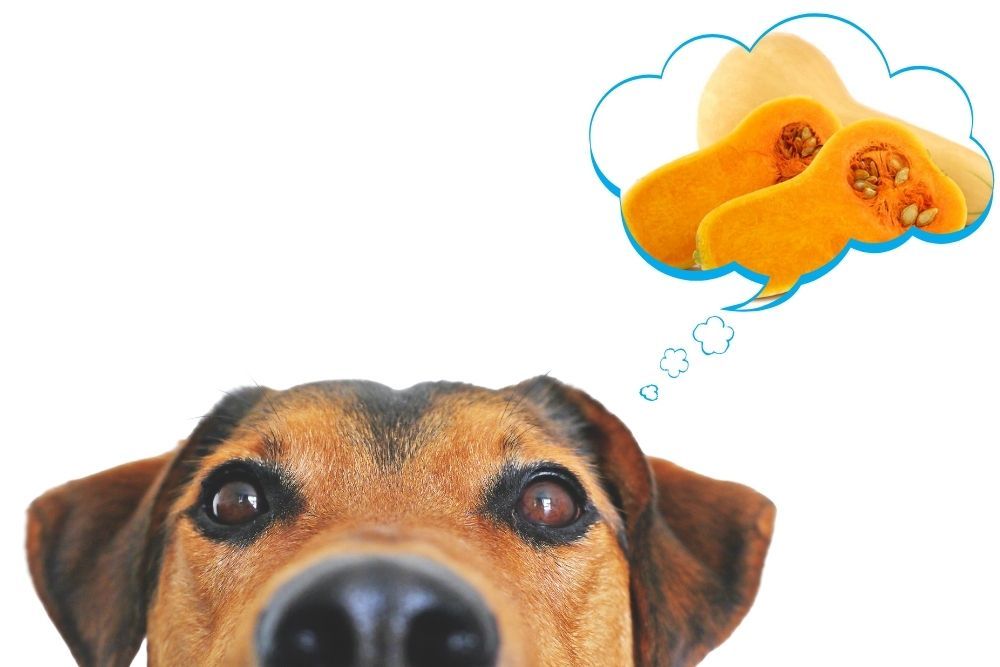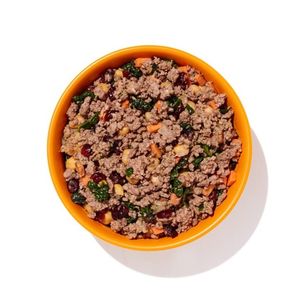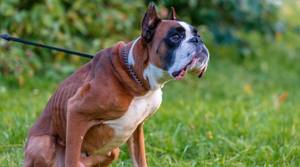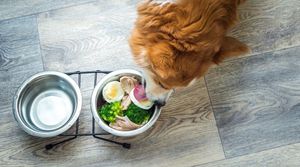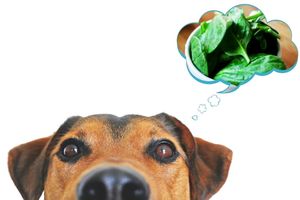As dog owners, we all want to feed our pets the healthiest food possible. A lot of owners will add vegetables to their dog's meals or make homemade treats for them. A popular vegetable that is used is butternut squash. The question is, is butternut squash safe for your dog to eat?
The simple answer is yes! Butternut squash is not only delicious, but it is also chock full of nutrients that are good for your dog. They can be prepared in a number of ways that will let you get creative with how you serve this tasty treat to your pups.
Here is everything that you need to know about butternut squash for your furry friend.
What is Butternut Squash?
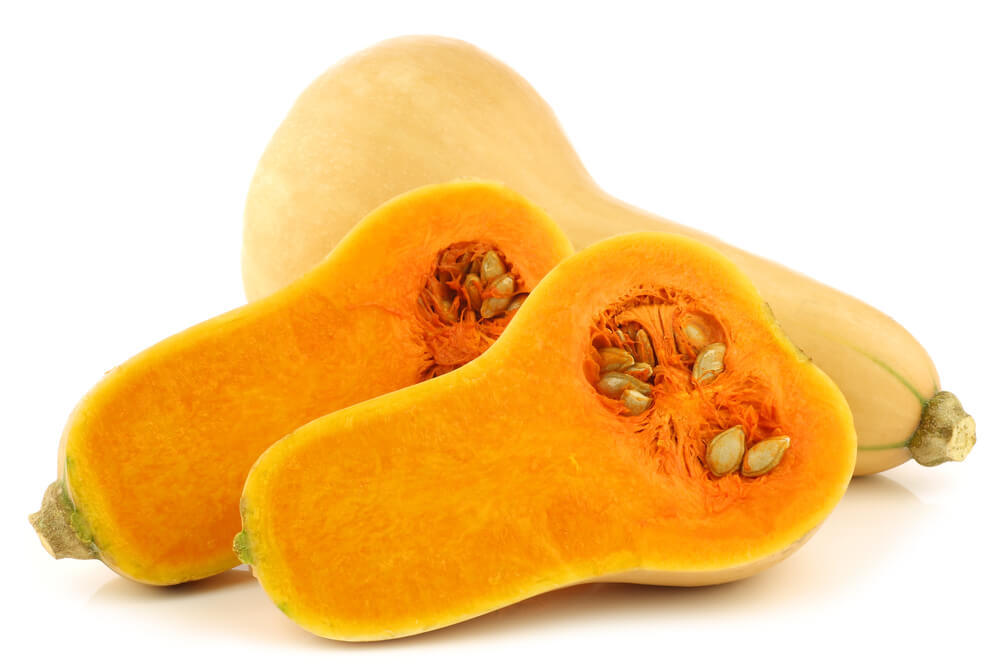
Butternut squash, believe it or not, is considered to be a fruit by botanical experts, more specifically a berry. That's a pretty large berry! It's part of the squash and pumpkin family and needs to be grown in warmer climates. It originated in Guatemala and Mexico, however, many of the butternut squash that we buy today is grown in Spain, Portugal, Honduras, and Brazil.
This seasonal winter squash is grown on a vine, much like pumpkins are. The taste is nutty and sweet and it's a good source of vitamin A, potassium, fiber, magnesium, and vitamin C. The botanical name for butternut squash is Cucurbita moschata. It is also known as a gramma or butternut pumpkin in New Zealand and Australia.
Other names that it goes by is sweet pumpkin, Kalyana poosannikai (Tamil), Kaddu (Hindi), Seegumbalakayi (Kannada), Thiyya gummadikaya (Telugu), and Mathanga (Malayalam).
What Nutrients Does Butternut Squash Offer Dogs?
Here's the nutritional value of Butternut Squash offered in 1 cup/serving measuring 205 grams.
- Calories – 82 kcal
- Total Carbohydrates – 21.5g
- Sugar – 4.0 grams
- Total Fat – 0.2 grams
- Total Omega-3 fatty acids – 49.2 milligrams
- Total Omega-6 fatty acids – 28.7 milligrams
- Protein – 1.8 grams
- Vitamin A – 22869IU
- Vitamin C – 31.0 milligrams
- Vitamin E (Alpha Tocopherol) – 2.6 milligrams
- Vitamin K
- Niacin – 2.0 milligrams
- Calcium – 84.0 milligrams
- Iron – 1.2 milligrams
- Magnesium – 59.4 milligrams
- Phosphorus – 55.4 milligrams
- Potassium – 582 milligrams
- Sodium – 8.2 milligrams
Is Butternut Squash Safe for Dogs?
When properly prepared and in moderation, butternut squash is safe for your dog. It has a number of benefits, such as having a good amount of potassium. Potassium is great for your dog's muscles, kidneys, enzyme creation, and nerves. Pet health professional, Dr. Karen Becker, states that you should have between 15% to 20% of vegetables and fruits in your furry friend's daily diet. It's also good for:
Hydrating the Skin
The vitamin A in butternut squash helps boost your dog's skin cell generation and keeps your dog's skin pH level balanced. The fiber in butternut squash helps to absorb excess water in the body, which helps keep their skin hydrated.
Assists Digestion
The vitamin A, vitamin B-6, fiber, potassium, and folates in butternut squash aids the digestion process of your dog. Butternut squash can also be used for dogs who need to have a bland diet, have a sensitive stomach, or have diarrhea or constipation. The fiber in butternut squash is also great for good gut health and helps to regulate healthier bowel movements.
Healthier Coat
Aside from being beneficial to your dog's skin, the nutrients in butternut squash help give them a shiny and healthy coat. The vitamin A in butternut squash helps prevent problems with hair loss or skin issues that can impact hair growth.
Strengthens the Nerves, Joints, Muscles, and Kidneys
As mentioned earlier, the nutrients in butternut squash are part of the building blocks that your dog needs to help develop and strengthen its muscles. Vitamin C in butternut squash helps your dog's body to be able to absorb iron better, which aids in helping the joints, nerves, and kidneys.
Strengthens the Immune System
The vitamin C in butternut squash strengthens your dog's immune system, just like it does for ours. It also aids in the healing process. The antioxidants in butternut squash help to reduce inflammation in the body.
Strengthens the Bones
The magnesium, calcium, and phosphorus in butternut squash help your dog to develop stronger bones, as well as assist their body in using carbohydrates and proteins more efficiently.
Take Note
One thing to bear in mind is that butternut squash is a starchy fruit/vegetable. If your dog is on the overweight side, monitor how much butternut squash you give them a day.
Help For Dogs With Diarrhea
As mentioned earlier, the fiber in butternut squash helps with bowel movements. This is especially good for your dog if they are having diarrhea or runny stool. The fiber helps to bind your dog's stool so that it is firmer, making it easier for it to move along its digestive tract.
Adding just a spoonful of cooked butternut squash to one meal can work wonders.
Take Note
You do need to remember that, too much fiber, or feeding them too much butternut squash can have the opposite effect and cause some constipation.
How Do You Prepare Butternut Squash for Your Dog?
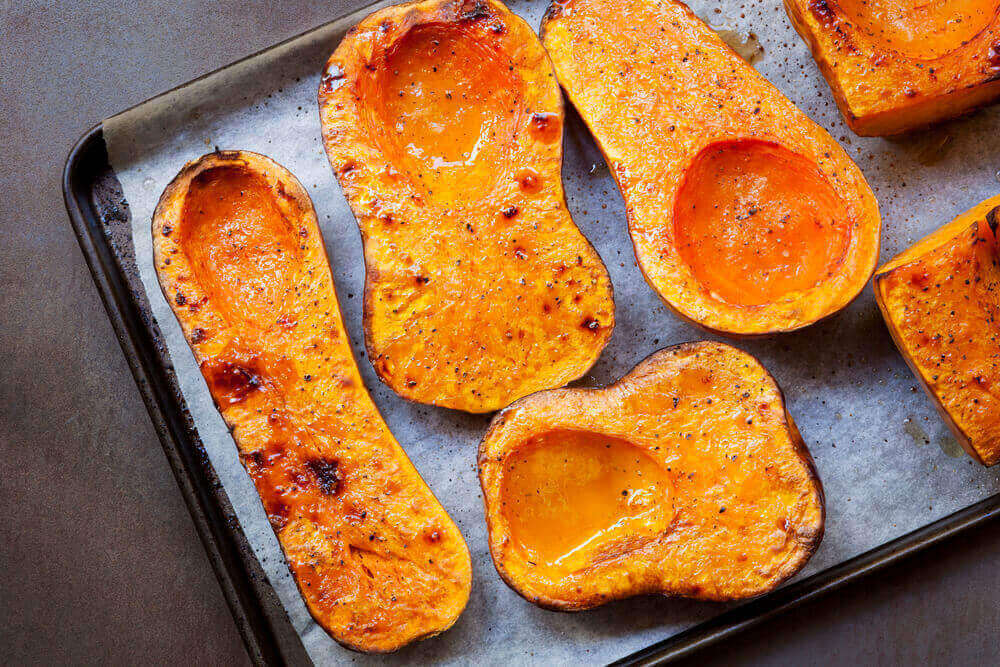
You can prepare butternut squash in so many ways for your dog. They can be steamed, roasted, baked, and microwaved. The only way that you should avoid preparing butternut squash for your dog is by frying it because it's not the healthiest option. You should also serve it plain, without any seasoning.
Can You Give Your Dog Raw Butternut Squash?
While raw butternut squash is not toxic to your dogs, it won't taste very nice uncooked.
Veterinarian Technician, Jessica Desrosiers, points out that butternut squash is very tough and fibrous before cooking and would be harder for your dog to digest properly. It isn't recommended to give butternut squash to your dog raw because it could give them a stomach ache, diarrhea, or vomiting, especially in pooches who have a sensitive digestive system.
Chunks of uncooked butternut squash can also pose a choking hazard for your dog because it's harder for them to chew it properly, and we all know how our pooches love to wolf down their food.
How About the Skin and Seeds?
Just like uncooked butternut squash, the skin is also very tough and hard, as well as difficult to break down. Make sure you properly peel the skin off of the squash before preparing it.
Butternut squash seeds are edible and non-toxic, however, they can irritate your pooch's throat if too many are eaten. If your dog has accidentally eaten a seed or two, there is no need to panic. You can pop the seeds in a blender and use it as a topper for your dog or yourself!
How Much Butternut Squash Should You Give Your Dog?
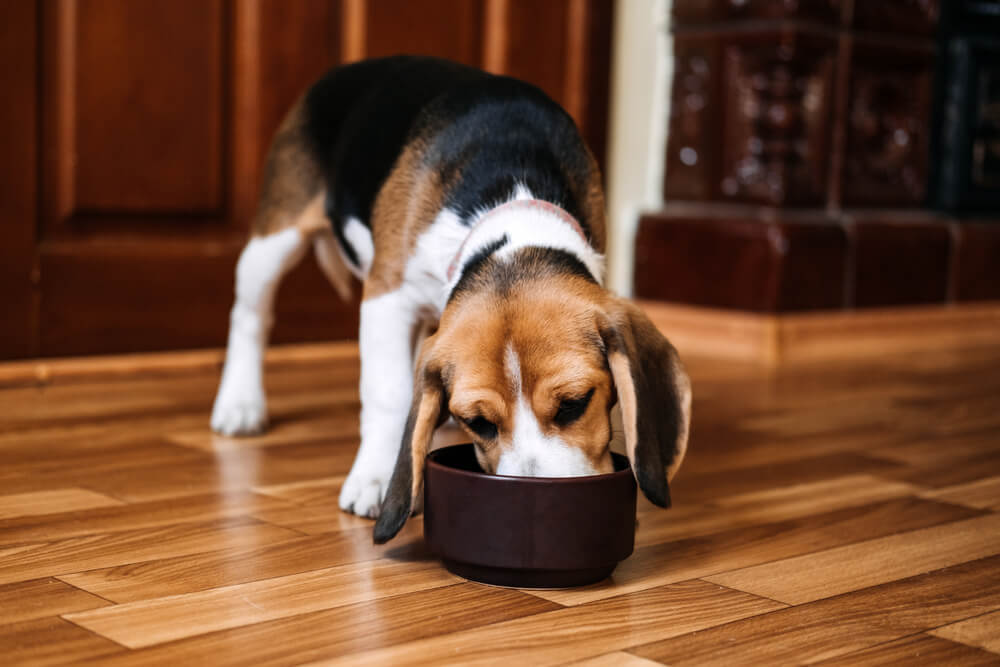
Butternut squash is low in fat and calories, and it is safe for your furry pal to eat regularly.
However, you should still use it in moderation because it is high in vitamin A. Too much vitamin A in your dog's system can lead to illness. Giving your dog a few spoonfuls per day is considered safe. If you have a small dog or toy dog, only give them a couple of teaspoons per day. Medium dogs can safely have 2 tablespoons a day and larger dogs can eat about 4 tablespoons a day.
Take Note
Rule of thumb: whether making treats for your dog or feeding them butternut squash cooked and plain, make sure it doesn't exceed 10% of your pooch's daily calorie consumption.
How to Feed Butternut Squash to Dogs
You can safely give your dog a couple of spoonfuls of butternut squash a day. Small dogs should get no more than 2 teaspoons a day, medium dogs can have 2 tablespoons a day, and larger dogs can have as much as 4 tablespoons a day.
Properly preparing butternut squash is important as well. Always be sure to cook butternut squash before feeding it to your dog. Here are some ways that you can make butternut squash for your pup.
If you are able to, buy organic butternut squash because organic fruits and vegetables aren't exposed to pesticides like conventional ones are. Before cooking, make sure you thoroughly wash and peel the butternut squash, and remove the seeds.
Raw Butternut Squash
I mentioned earlier that raw butternut squash can be harder to digest for your dog. However, if you chop it into very small pieces, or puree it, it will be easier for them to eat.
Cooked Butternut Squash
When it comes to how to cook butternut squash for your dog, anything goes! Just leave out the seasonings. You can steam, boil, mash, or roast butternut squash. The sweet nutty flavor alone will get your dog excited to eat. You can also add it to other healthy foods for your dog.
Our Top Recommended Kibble With Butternut Squash
If you don't have the time to cook up butternut squash yourself, there are some great brands of dog kibble that use butternut squash in their recipes.
Ollie Fresh Pet Food: Lamb & Butternut Squash Recipe
This lamb and butternut squash recipe is a good choice for dogs who have food allergies. It also has kale and cranberries in it, which are nutrient-dense. Kale helps with skin and fur health and fiber aids in healthy digestion. Ollie dog food uses minimal processing and whole foods that are safe enough for humans to eat. No fillers or artificial flavors.
Earthborn Holistic Venture Limited Turkey & Butternut Squash
Earthborn's version of a butternut squash recipe uses smoked turkey. Their dog food is grain and gluten-free and they use fresh turkey and butternut squash from farms that are family-owned and trusted. The recipe also includes methionine and taurine for your dog's heart health. There are no fillers, by-products, artificial colors, artificial preservatives, GMO, legumes, peas, white potato, or lentils used in their dog food. Even the bag that it comes in is 40% plant-based and can be resealed.
Stella & Chewys Wild Red Raw Blend Kibble With Grains
Stella & Chewy's dog food recipe uses a blend of meat sources that include, beef, lamb, pork, goat, venison, and bison. They ensure there is no waste by using organ and muscle meat, as well as cartilage. While butternut squash isn't the main ingredient. It is included for its fiber content. There are no preservatives, filler, artificial colors, or ingredients and their food are free from legumes and potatoes.
Homemade Butternut Squash Dog Treats
If you fancy making your own butternut squash treats for your dog, try baking it at a low temperature to dehydrate it and create some chewy treats. Or, mash it up with some oats, shape it and bake it to make dog biscuits. An interesting recipe from Rover that you can try is Stuffed Butternut Squash treats, also referred to as Turducken.
What You'll Need
- 1 Butternut squash
- 1 Zucchini
- 1 Carrot
- 1 Celery Rib
- 1/2 cup Oatmeal
- 2 Eggs
- 1 tsp Turmeric
- 1 tsp Parsley
- 1 tsp Sage
- Butcher’s twine to truss (Optional)
How It's Done
Start by preheating your oven to 350º (f)
Step 1 – cut the butternut squash in half. Create a hollowed-out channel that will be big enough to fit the zucchini. You can do this using a spoon, melon baller, or ice cream scoop. Save the scooped-out squash because you will be using it for the stuffing.
Step 2 – take the zucchini and cut the ends so that it fits in the squash. Cut the zucchini in half and create a channel that is big enough to fit the carrot. Save the excess zucchini for the stuffing.
Step 3 – trim the carrot so that it fits in the zucchini and then peel it.
Step 4 – prepare the stuffing. Dice the celery rib and add it, and the leftover parts of the squash, zucchini, and carrot to a food processor. Add the oatmeal, 2 eggs, and spices then mix until you have a smooth paste.
Step 5 – assembling. On a baking tray, place your two squash halves. Fill the channel with the stuffing mixture while leaving room for your zucchini. Place the zucchini in the squash. Fill the channel with stuffing while leaving room for the carrot. Make sure everything fits smoothly and place the two halves together, using butchers twine to hold it in place while it bakes.
Bake for 60 to 90 minutes (depending on the thickness of the squash). The middle temperature should be 165 (f) to ensure the egg has cooked properly. Remove it from the oven and allow it to cool. Cut into slices to serve to your dog.
Thanks to Rover.com for this wonderful recipe.
Homemade Butternut Squash Dog Food
Another alternative is to make your own dog kibble using butternut squash. It's simple to do and can be made in your slow cooker.
What You'll Need
- Ground beef - 2 1/2 pounds
- Brown rice - 1 1/2 cups
- Water - 4 cups
- Kidney beans – 15-ounces (1 can). Make sure to drain and rinse
- Butternut squash - 1 1/2 cups, chopped
- Carrots - 1 1/2 cups, chopped
- Peas - 1/2 cup, canned or frozen
How It's Done
In a 6 quart slow cooker, add 4 cups of water. Start adding in the ground beef, squash, peas, carrots, kidney beans, and brown rice while stirring. Set the slow cooker on the low heat setting, cover and let it sit for about five to six hours. Alternatively, you can use the high heat setting and cook for two to three hours. Be sure to stir it regularly while it cooks. Allow it to cool before feeding your dog.
Thanks to DamnDelicious.net for this recipe.
For more great recipes try Easy Homemade Quinoa Dog Food or Healthy Homemade Hummus for Dogs.
Are There Alternative Ingredients?
You can substitute other ingredients to make this recipe if you choose to:
- Pumpkin
- Zucchini
- Other varieties of squash
- Chickpeas
- Lentils
- Quinoa
- Plain white rice

